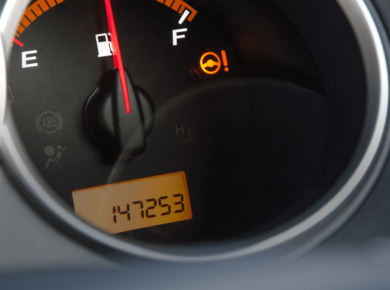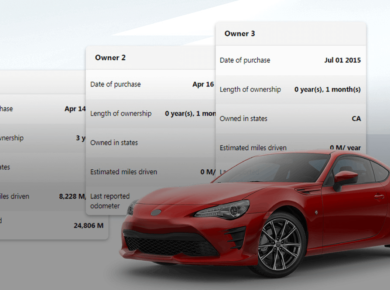Vehicle history report scams are on the rise, ensnaring private sellers and unsuspecting buyers alike. A scammer posing as a potential buyer will often request that you file a vehicle history report from a specific website before agreeing to purchase. At ClearVin, we want you to recognize these schemes, whether it’s a vehicle history report scam masquerading as a legitimate service or a broader network of vehicle report scams, and learn how to protect yourself.
Scams Reported to ClearVin
Most of these scams begin with friendly text messages that appear to come from a potential car buyer. The scammer claims to be interested in your car listed on Craigslist or a similar website and asks for a vehicle history report from a specific website, pretending to care about the car’s history before purchase. They direct you to a professional-looking portal with overpriced reports, promising instant access to records.
At first, it may seem like a serious buyer genuinely concerned about the vehicle’s condition. However, once you pay for the report, they disappear. Typically, you receive a blank PDF or a generic summary.
It can get even worse — sometimes they steal your credit card information and the personal data you entered on their fake website. Also, if someone shares a link via email or in a text message, remember it can be a phishing – it’s better to type the website by yourself in your browser.
A more sophisticated version of this scam involves manipulating the payment terms. Many websites advertise a vehicle report for just $1–$2, but once they have access to your credit card, they begin charging a monthly subscription without clear consent. Always review the payment terms carefully. Remember, a legitimate vehicle history report can’t realistically cost just $1 — if it sounds too good to be true, there are likely hidden fees involved.
Warning Signs
Be alert to these red flags when you review your inbox or click links in a listing:
- Messages from an unknown phone number urging you to act fast
- Poor website, no report sample, and domains that don’t match known providers or lack any physical address
- No padlock icon before the URL (which means that it is insecure to enter your credit card details)
- Website is not listed as an approved NMVTIS data provider
- Requests for payment via gift cards, wire transfers, or cryptocurrency. Requests for your payment info, or for you to provide suspicious payment links.
- Poor grammar, misspellings, or odd branding inconsistent with car dealers you know
If any of these appear, pause before sharing personal data or funds. Consider checking with your local business bureau or the Federal Trade Commission (FTC) for the latest alerts on history report scams.
Variant Names to Watch
Scammers use creative labels and methods to disguise their work, including:
- VIN report scams boast about detailed accident logs
- Vehicle registry reports scam sites imitating title searches
- USA vehicle report scam suggesting government ties
- VH reports scam bulletin‑style pages
- Car VIN report scams for mileage audits
- Tire-tracked vehicle history report scam promising tire rotation records.
- Auto vehicle reports scam packages
- Standalone auto vehicle report scam offers that charge subscription fees for no data.
Each of these carries the same risk: no genuine information delivered. Sometimes, scammers offer reports for $30–40, which is extremely overpriced, as the average price for an NMVTIS report starts at $15–20 for a single VIN check.
Potential Consequences
Falling for a car history scam or one of the many car history report scams can lead to serious fallout. Scammers may steal your credit card information outright. Worse, by obtaining your social security number, they can commit identity theft that haunts you for years.
Also, relying on fabricated data from a car history audit scam or a vehicle history reporter scam could cause you to make poor purchasing decisions, end up with a lemon, or face legal headaches when titles don’t transfer correctly. Some fraudsters even add a car warranty scam on top of the bogus report, selling you fake coverage you’ll never be able to use.
Staying Safe
To avoid these traps, always purchase a vehicle history from an approved provider of vehicle history reports. ClearVin and other NMVTIS‑compliant services offer direct, secure access to verified records. When you need to review a car history report:
- Manually enter the known URL into your browser – never click a random link.
- Confirm the site’s phone number and address via reputable directories.
- Read reviews from other car sellers and car dealers to validate the service.
- Use official channels when you buy vehicle reports scam‑free, avoiding bulk “buy vehicle reports scam” pitches. Type the website name into Google with keywords like “scam” or “reviews“. If others have been scammed, you’ll often find warnings right away.
- Perhaps you wonder, “Is my vehicle audit report a scam?” If you have any doubts, contact the provider’s support line before paying.
- Do not enter your credit card info or personal details on insecure websites.
Sticking with reputable, well‑known outlets will spare you the headache of cheap vehicle report scam deals and the stress of dealing with auto vehicle reports scam fallout.
Reporting and Recovery
If you suspect you’ve encountered a vehicle report scam, act quickly:
- Contact your bank or credit card issuer to dispute any unauthorized charges.
- Learn how to report vehicle purchase scam incidents, then file a complaint with the FTC.
- Notify your local business bureau so others can be warned about emerging threats.
- Monitor your accounts and consider a free credit freeze to block potential identity theft.
Final Word
From a modest VIN scam to elaborate bundles selling fake records, vehicle history report scams come in many guises. By staying alert to red flags, using only NMVTIS‑approved services, and verifying any request for your VIN or payment, you can steer clear of fraud. If you ever fall victim, or need advice on a suspected vehicle history report scam, remember that ClearVin is here to guide you toward safe, transparent car transactions.









